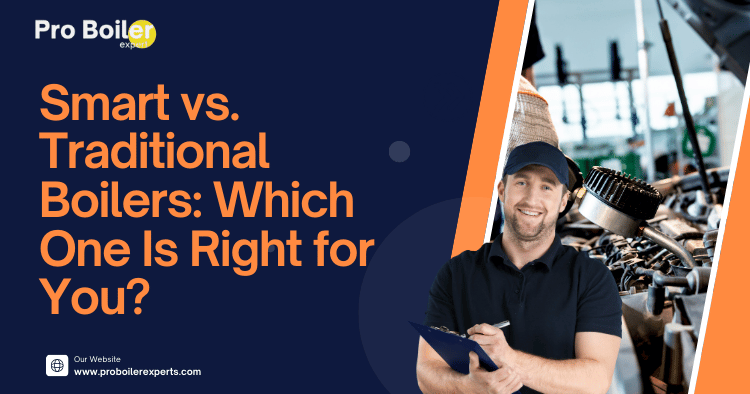Table of Contents
- Introduction
- What Are Traditional Boilers?
- What Are Smart Boilers?
- Key Differences Between Smart and Traditional Boilers
- 4.1 Efficiency
- 4.2 Control and Customization
- 4.3 Cost
- 4.4 Maintenance
- Pros and Cons of Smart Boilers
- Pros and Cons of Traditional Boilers
- FAQs
- Conclusion
Introduction
Choosing the right boiler for your home is crucial, especially when it comes to comfort and energy efficiency. With advancements in technology, the market now offers both traditional and smart boilers, each with unique features and benefits. In this article, we’ll delve into the differences between smart and traditional boilers, helping you make an informed decision that best suits your needs.
What Are Traditional Boilers?
Traditional boilers, also known as conventional or regular boilers, have been the go-to heating solution for many households for years. These systems typically consist of a boiler unit, a hot water cylinder, and a network of pipes that distribute heat throughout your home.
Key Features of Traditional Boilers:
- Gravity-Fed System: Often connected to a cold water tank, these boilers rely on gravity to ensure hot water is delivered.
- Stored Hot Water: They can provide a large volume of hot water quickly, making them ideal for homes with high hot water demands.
- Lower Initial Costs: Generally, traditional boilers are less expensive to purchase and install than their smart counterparts.
For more detailed information on traditional boilers, check out Top 5 Benefits of Choosing Conventional Boilers for Your Home.
What Are Smart Boilers?
Smart boilers represent the new wave of heating technology, designed to integrate seamlessly with modern home automation systems. These boilers are equipped with advanced technology that allows for remote monitoring and control through a smartphone or tablet.
Key Features of Smart Boilers:
- Remote Access: Users can adjust settings from anywhere, ensuring optimal comfort and efficiency.
- Energy Monitoring: Many smart boilers offer real-time energy consumption tracking, helping you manage your energy use more effectively.
- Integration with Smart Home Systems: They can connect with other smart devices, such as thermostats and sensors, to create a cohesive heating solution.
For more insights into smart boilers, visit Top 5 Smart Boilers Revolutionizing Home Heating 2024.
Key Differences Between Smart and Traditional Boilers
4.1 Efficiency
One of the most significant differences between smart and traditional boilers is their efficiency. Smart boilers often boast higher efficiency ratings due to their ability to adjust heating levels based on real-time data. In contrast, traditional boilers may run at a constant rate, potentially wasting energy.
| Feature | Smart Boilers | Traditional Boilers |
|---|---|---|
| Efficiency Rating | Up to 98% | 70-90% |
| Energy Monitoring | Yes | No |
4.2 Control and Customization
Smart boilers excel in control and customization. With user-friendly apps, homeowners can easily adjust temperatures, set schedules, and receive alerts for maintenance needs. Traditional boilers, while reliable, lack this level of control and often require manual adjustments.
4.3 Cost
When it comes to cost, traditional boilers are generally more affordable upfront. However, smart boilers can lead to savings in the long run due to their efficiency and energy-saving features. It’s essential to weigh the initial investment against potential long-term savings.
4.4 Maintenance
Smart boilers often come with self-diagnostic capabilities, alerting homeowners to potential issues before they become significant problems. Traditional boilers may require more frequent manual checks to ensure they are functioning correctly.
Pros and Cons of Smart Boilers
Pros:
- Enhanced Efficiency: Higher efficiency rates lead to lower energy bills.
- Convenience: Remote access and automation make managing home heating easy.
- Integration: Works well with other smart home devices.
“Smart technology not only provides convenience but also helps in monitoring energy usage effectively.”
Cons:
- Higher Initial Costs: The upfront investment for smart boilers can be substantial.
- Dependence on Technology: Issues with Wi-Fi or app functionality can hinder performance.
Pros and Cons of Traditional Boilers
Pros:
- Lower Cost: More affordable to install and maintain.
- Reliability: Tried-and-true technology that many homeowners trust.
Cons:
- Less Efficient: May result in higher energy bills due to less efficient operation.
- Limited Control: Less customization compared to smart options.
FAQs
1. Are smart boilers worth the investment?
Yes, if you prioritize energy efficiency and convenience, smart boilers can provide significant long-term savings despite their higher initial costs.
2. How long do traditional boilers last?
Traditional boilers can last between 10 to 15 years, depending on maintenance and usage.
3. Can I install a smart boiler myself?
While minor adjustments can be made, it’s recommended to hire a professional for installation to ensure safety and compliance with local regulations.
4. Do smart boilers require special maintenance?
Smart boilers may require regular software updates and checks on their connectivity, in addition to standard maintenance.
Conclusion
Choosing between a smart and traditional boiler ultimately depends on your specific needs, budget, and preferences. Smart boilers offer modern convenience and efficiency, while traditional boilers provide reliability at a lower cost. Assess your home’s heating requirements, consider your budget, and make an informed decision that will keep your home cozy for years to come!
For more information on home heating solutions, consider visiting Energy.gov.
Also look for Top 5 Benefits of Smart Boilers for additional insights on how smart technology can enhance your heating system.





